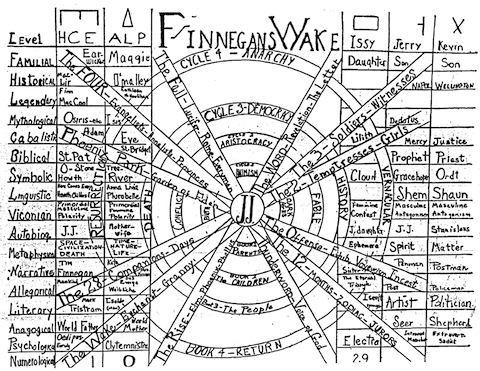
After the publication and eventual triumph of Ulysses, James Joyce spent the remainder of his life working secretively on a “Work in Progress” that he would publish in 1939 as Finnegans Wake, a novel that largely abandons the trappings of the novel and should better be called, as Anthony Burgess called it, a prose-poem—a beast that strikes the common reader as, in Burgess’ words, “too literary” and “horribly opaque.” My first encounter with this most intimidating book felt like something between hearing Italian comedian Adriano Celentano’s rapturously gibberish approximation of the sound of English in song and Michael Chabon’s detection of a “faintly Tolkienesque echo.” Like Chabon, I too could “hear the dreaming suspirations of the princess who lay sleeping in its keep.” Yet I was a bit too old for fantasy, I thought, and far too out of my depth in Joyce’s invented language, built, Burgess writes, “on the freshly uncovered roots of English.”
I’ve never lost my fear of the book, and never found it accommodating to any narrative sense. And it is fearful and unaccommodating if one approaches it like a conventional novel that will yield its secrets eventually and reward the diligent reader with some sort of singular payoff. Nevertheless, the sheer pleasure one can derive—conventional expectations duly set aside—from the almost tactile quality of Joyce’s prose, its earthy, ancient, elven sounds, seems more to the point of appreciating this odd, frustrating work. Perhaps, like any well-written poem, one simply needs to hear it read aloud. Joyce himself said so, and so you can. Ubuweb brings us the entirety of Patrick Healy’s reading of the text, recorded over a four-day period in 1992 at Dublin’s Bow Lane Recording Studios. (You can hear a small opening segment above.) Healy’s reading is not without its faults—he rushes and stumbles at times—but that seems a mean commentary on a recording of this length and difficulty. Listen to the first installment above and the rest here. You may just have an epiphany or two.
(Diagram above by Hungarian artist László Moholy-Nagy)
Related Content:
James Joyce Reads ‘Anna Livia Plurabelle’ from Finnegans Wake
See What Happens When You Run Finnegans Wake Through a Spell Checker
Hear Joey Ramone Sing a Piece by John Cage Adapted from James Joyce’s Finnegans Wake
Free eBooks: Read All of Proust’s Remembrance of Things Past on the Centennial of Swann’s Way
550 Free Audio Books: Download Great Books for Free
Josh Jones is a writer and musician based in Durham, NC. Follow him at @jdmagness


Great material for a filibuster!
Needs a more characteristic brogue and melody.
That’s easy for you to say Kevin.
Patrick Healy’s reading is 25 hours, not 35.
We also did an unabridged version, set to music. Creative commons — waywordsandmeansigns.com
is the audio still available? It doesn’t seem to work
That’s funny. It is saying something, but it takes a ridiculous amount of studying to get the slightest inkling of what it’s talking about; my friend explained some of it to me.